| Listing 1 - 10 of 11 | << page >> |
Sort by
|
Book
ISBN: 0674332466 0674332458 Year: 2014 Publisher: Cambridge, MA : Harvard University Press,
Abstract | Keywords | Export | Availability | Bookmark
 Loading...
Loading...Choose an application
- Reference Manager
- EndNote
- RefWorks (Direct export to RefWorks)
Book
ISBN: 9781412961042 1412961041 Year: 2009 Publisher: Los Angeles: Sage,
Abstract | Keywords | Export | Availability | Bookmark
 Loading...
Loading...Choose an application
- Reference Manager
- EndNote
- RefWorks (Direct export to RefWorks)
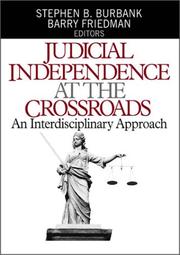
ISBN: 0761926569 0761926577 1452229570 132241839X 1452262888 9781452262888 9781452229577 9780761926566 9781322418391 Year: 2002 Publisher: Thousand Oaks, CA : Sage Publications,
Abstract | Keywords | Export | Availability | Bookmark
 Loading...
Loading...Choose an application
- Reference Manager
- EndNote
- RefWorks (Direct export to RefWorks)
This book provides a path-breaking, interdisciplinary collection of essays by leading scholars on the contentious issues of judicial independence and federal judicial selection.
Judicial process --- Judicial power --- Judges --- Courts --- Processus judiciaire --- Pouvoir judiciaire --- Juges --- Tribunaux --- Judges - United States. --- Judicial power - United States. --- Judicial process - United States. --- Law - U.S. --- Law, Politics & Government --- Law - U.S. - General
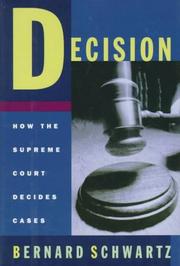
ISBN: 0195098595 0195118006 9780195098594 Year: 1996 Publisher: New York (N.Y.) : Oxford university press,
Abstract | Keywords | Export | Availability | Bookmark
 Loading...
Loading...Choose an application
- Reference Manager
- EndNote
- RefWorks (Direct export to RefWorks)
Judicial process --- Processus judiciaire --- United States. --- Etats-Unis. --- -United States. Supreme Court --- -Decision making, Judicial --- Judicial behavior --- Judicial decision making --- Judges --- Law --- Procedure (Law) --- Psychological aspects --- Interpretation and construction --- United States. Supreme Court --- Judicial process - United States --- Supreme Court of the United States
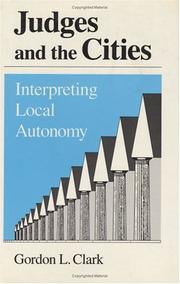
ISBN: 0226107531 9780226107530 Year: 1985 Publisher: Chicago (Ill.): University of Chicago press,
Abstract | Keywords | Export | Availability | Bookmark
 Loading...
Loading...Choose an application
- Reference Manager
- EndNote
- RefWorks (Direct export to RefWorks)
Local government --- Social institutions --- Social structure --- Urban policy --- Autonomy --- Judicial process --- Law and legislation --- Autonomy. --- Interpretation and construction. --- Interpretation and construction --- Local government - United States --- Social institutions - United States --- Social structure - United States --- Urban policy - United States --- Judicial process - United States --- Local government - Law and legislation - United States
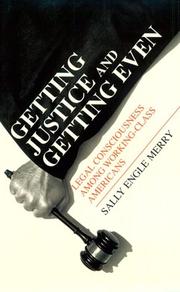
ISBN: 9780226520698 0226520684 0226520692 Year: 1990 Publisher: Chicago (Ill.): University of Chicago press,
Abstract | Keywords | Export | Availability | Bookmark
 Loading...
Loading...Choose an application
- Reference Manager
- EndNote
- RefWorks (Direct export to RefWorks)
Ordinary Americans often bring family and neighborhood problems to court, seeking justice or revenge. The litigants in these local squabbles encounter law at its boundaries in the corridors of busy city courthouses, in the offices of court clerks, and in the church parlors used by mediation programs.
"Getting Justice and Getting Even" concerns the legal consciousness of working class Americans and their experiences with court and mediation. Following cases into and through the courts, Sally Engle Merry provides an ethnographic study of local law and of the people who use it in a New England city. The litigants, primarily white, native-born, and working class, go to court because as part of mainstream America they feel entitled to use its legal system. Although neither powerful nor highly educated, they expect the law's support when they face intolerable infringements of their rights, privacy, and safety. Yet as personal problems enter the legal system and move through mediation sessions, clerk's hearings, and prosecutor's conferences, the citizen plaintiff rapidly loses control of the process. Court officials and mediators interpret and characterize the meaning of these experiences, reframing and categorizing them in different discourses. Some plaintiffs yield to these interpretations, but others resist, struggling to assert their own version of the problem.
Ultimately, Merry exposes the paradox of legal entitlement. While going to court allows an individual to dominate domestic relationships, the litigant must increasingly yield control of the situation to the court that supplies that power.
Law --- Judicial process --- Dispute resolution (Law) --- Sociological jurisprudence --- Cases --- Sociological jurisprudence. --- Processus judiciaire --- Socialisation juridique --- Règlement de conflits --- Cases. --- Social stratification --- Sociology of law --- Law - United States --- Judicial process - United States --- Dispute resolution (Law) - United States --- Law - New England - Cases --- Règlement de conflits
Book
ISBN: 9780674975811 0674975812 0674986091 0674986113 Year: 2018 Publisher: Cambridge, MA : Harvard University Press,
Abstract | Keywords | Export | Availability | Bookmark
 Loading...
Loading...Choose an application
- Reference Manager
- EndNote
- RefWorks (Direct export to RefWorks)
"The book addresses questions about the roles of law and politics and the challenge of legitimacy in constitutional adjudication in the Supreme Court. With all sophisticated observers recognizing that the Justices' political outlooks influence their decision making, many political scientists, some of the public, and a few prominent judges have become Cynical Realists. In their view Justices vote based on their policy preferences, and legal reasoning is mere window-dressing. This book rejects Cynical Realism, but without denying many Realist insights. It explains the limits of language and history in resolving contentious constitutional issues. To rescue the notion that the Constitution is law that binds the Justices, the book provides an original account of what law is and means in the Supreme Court. It also offers a theory of legitimacy in Supreme Court adjudication. Given the nature of law in the Supreme Court, we need to accept and learn to respect reasonable disagreement about many constitutional issues. If so, the legitimacy question becomes: how would the Justices need to decide cases so that even those who disagree with the outcomes ought to respect the Justices' processes of decision? The book gives a fresh and counterintuitive answer to that vital question. Adapting a methodology made famous by John Rawls, it argues that the Justices should strive to achieve a "reflective equilibrium" between their interpretive principles, framed to identify the Constitution's enduring meaning, and their judgments about appropriate outcomes in particular cases, evaluated as prescriptions for the nation to live by in the future. The book blends the perspectives of law, philosophy, and political science to answer theoretical and practical questions of pressing national importance"--
Political questions and judicial power --- Judicial process --- Constitutional law --- United States. --- Politique et pouvoir judiciaire --- Processus judiciaire --- Droit constitutionnel --- États-Unis. --- Political questions and judicial power - United States. --- Judicial process - United States. --- Constitutional law - United States. --- Etats-Unis --- Cynical realism (Law)
Book
ISBN: 0893350125 0470991801 9780470991800 9780893350123 Year: 1977 Publisher: New York (N.Y.): Spectrum,
Abstract | Keywords | Export | Availability | Bookmark
 Loading...
Loading...Choose an application
- Reference Manager
- EndNote
- RefWorks (Direct export to RefWorks)
Psychology and law --- Psychology --- Criminal psychology --- Judicial process --- Law --- Psychology, Forensic --- Psychological aspects --- 343.9 --- -Law --- -Psychology, Forensic --- Juridical psychology --- Juristic psychology --- Legal psychology --- Forensic sciences --- Psychology, Applied --- Acts, Legislative --- Enactments, Legislative --- Laws (Statutes) --- Legislative acts --- Legislative enactments --- Jurisprudence --- Legislation --- Decision making, Judicial --- Judicial behavior --- Judicial decision making --- Judges --- Procedure (Law) --- Criminal psychiatry --- Criminals --- Psychology, Criminal --- Criminal anthropology --- Psychology, Pathological --- Criminologie --(algemeen) --- Interpretation and construction --- Criminal psychology. --- Forensic psychology. --- Psychological aspects. --- 343.9 Criminologie --(algemeen) --- Forensic psychology --- Psychology, Juridical --- Psychology, Juristic --- Psychology, Legal --- Therapeutic jurisprudence --- Judicial process - United States --- Law - Psychological aspects
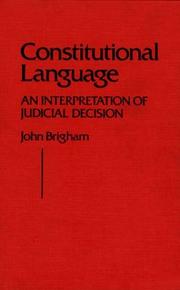
ISBN: 0313204209 9780313204203 Year: 1978 Volume: no. 17 Publisher: Westport (Conn.): Greenwood,
Abstract | Keywords | Export | Availability | Bookmark
 Loading...
Loading...Choose an application
- Reference Manager
- EndNote
- RefWorks (Direct export to RefWorks)
Public law. Constitutional law --- Legal theory and methods. Philosophy of law --- Law of civil procedure --- Judicial process --- Law --- Processus judiciaire --- Droit --- Language --- Langage --- United States --- Constitutional law --- Interpretation and construction --- -Law --- -Constitutional law --- -#SBIB:309H270 --- 347.9 --- Constitutional limitations --- Constitutionalism --- Constitutions --- Limitations, Constitutional --- Public law --- Administrative law --- Acts, Legislative --- Enactments, Legislative --- Laws (Statutes) --- Legislative acts --- Legislative enactments --- Jurisprudence --- Legislation --- Decision making, Judicial --- Judicial behavior --- Judicial decision making --- Judges --- Procedure (Law) --- Politieke communicatie: algemene werken --- Gerechtelijk privaatrecht. Burgerlijk procesrecht. Burgerlijke rechtsvordering. --- Psychological aspects --- Language. --- 347.9 Gerechtelijk privaatrecht. Burgerlijk procesrecht. Burgerlijke rechtsvordering. --- #SBIB:309H270 --- Language, Legal --- Legal language --- Legal style --- Style, Legal --- Bill drafting --- Gerechtelijk privaatrecht. Burgerlijk procesrecht. Burgerlijke rechtsvordering --- Interpretation and construction. --- Judicial process - United States --- Law - Language --- Constitutional law - United States
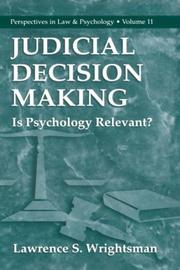
ISBN: 0306461544 1461371783 1461548071 9780306461545 Year: 1999 Volume: 11 Publisher: New York: Kluwer academic/Plenum,
Abstract | Keywords | Export | Availability | Bookmark
 Loading...
Loading...Choose an application
- Reference Manager
- EndNote
- RefWorks (Direct export to RefWorks)
In the mid-1970s, as a social psychologist dedicated to the application of knowl edge, I welcomed our field's emerging interest in the legal system. I have al ways been fascinated by jury trials-something about the idea that two con ceptions of the truth were in irrevocable conflict and jurors could choose only one of them. More important, the criminal justice system is a major social force that has been ignored by social psychologists for most of the twentieth century. As I systematically began to explore the applications of social psycho logical concepts to the law 20 years ago, I experienced the delight of discovery similar to that of a child under a Christmas tree. It has been satisfying to be among the cohort of researchers who have studied the legal system, especially trial juries, from a psychological perspective. I believe we have learned much that would be useful if the system were to be revised. Hlf the system were to be revised" . . . there's the rub. As I have stated, my original motivation was the application of knowledge. Like other social scien tists, I believed-perhaps arrogantly-that the results of our research efforts could be used to make trial juries operate with more efficiency, accuracy, and satisfaction. Qver the last two decades, much knowledge has accumulated. How can we put this knowledge to work? Judges are the gatekeepers of the legal system.
Judges --- Judicial process --- Law --- Psychological aspects. --- Thinking --- Behavioral Sciences --- Social Control, Formal --- Health Care Economics and Organizations --- Behavioral Disciplines and Activities --- Mental Processes --- Sociology --- Social Sciences --- Psychiatry and Psychology --- Psychological Phenomena and Processes --- Health Care --- Anthropology, Education, Sociology and Social Phenomena --- Decision Making --- Jurisprudence --- Psychology --- Law - U.S. --- Law, Politics & Government --- Law - U.S. - General --- Psychological aspects --- United States --- Psychology. --- Personality. --- Social psychology. --- Clinical psychology. --- Criminology. --- Law and Psychology. --- Personality and Social Psychology. --- Clinical Psychology. --- Criminology and Criminal Justice, general. --- Crime --- Social sciences --- Criminals --- Psychiatry --- Psychology, Applied --- Psychological tests --- Mass psychology --- Psychology, Social --- Human ecology --- Social groups --- Personal identity --- Personality psychology --- Personality theory --- Personality traits --- Personology --- Traits, Personality --- Individuality --- Persons --- Self --- Temperament --- Behavioral sciences --- Mental philosophy --- Mind --- Science, Mental --- Human biology --- Philosophy --- Soul --- Mental health --- Study and teaching --- Judges - United States. --- Judicial process - United States. --- Law - Psychological aspects. --- PSYCHOLOGIE JUDICIAIRE --- DECISION JUDICIAIRE --- MARIAGE HOMOSEXUEL --- COUR SUPREME --- EXPERTISE --- ELABORATION
| Listing 1 - 10 of 11 | << page >> |
Sort by
|

 Search
Search Feedback
Feedback About UniCat
About UniCat  Help
Help News
News